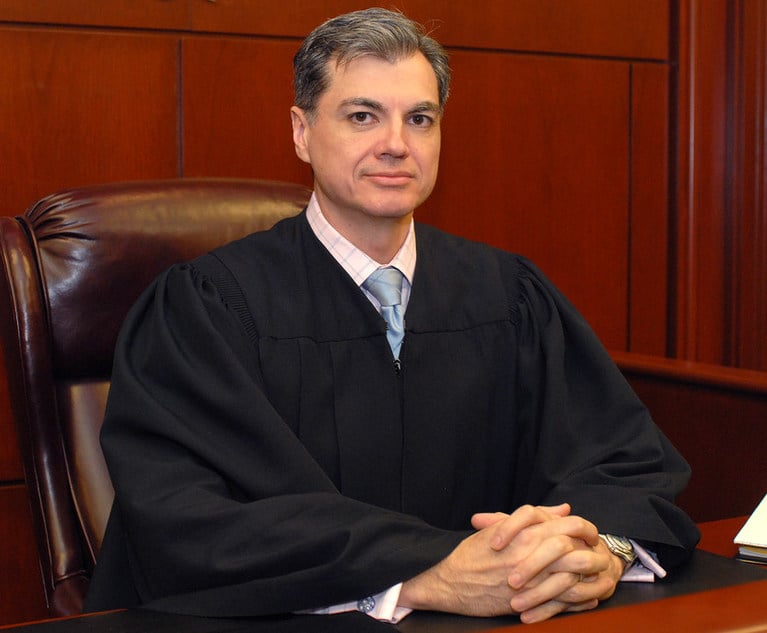Thank you for reading The Marble Palace Blog, which I hope will inform and surprise you about the Supreme Court of the United States. My name is Tony Mauro. I’ve covered the Supreme Court since 1979 and for ALM since 2000. I semiretired in 2019, but I am still fascinated by the high court. I’ll welcome any tips or suggestions for topics to write about. You can reach me at [email protected].
When the pandemic began in early 2020, Supreme Court scholar Todd Peppers looked for “little projects that kept [him] sane.”
He did some research about John Knox, a law clerk for Supreme Court Justice James McReynolds in 1936. Knox wrote a revealing memoir for that year that turned into a book in 2002.
Knox was something of a pack rat, so it was not surprising that he donated his personal papers and correspondence to various law school libraries. A group of letters at the University of Chicago caught Peppers’ eye, and the letters—some petty and others intriguing—turned into another revealing report about life at the Supreme Court in the 1930’s and beyond.
The letters to Knox came from Gertrude Jenkins, a rare female among the higher ranks of Supreme Court staff. She served as a secretary for Chief Justice Harlan Fiske Stone for several years, later working for McReynolds and Justice Felix Frankfurter as well. In the numerous letters sent to Knox, Jenkins pulled no punches about the justices, though she said kind words as well.
“What is most striking about the letters is Jenkins’s open contempt for Justices McReynolds and Frankfurter,” Peppers wrote in an article about Jenkins in the latest Green Bag. “Jenkins had a series of nicknames for [McReynolds], such as ‘Old buzzard,’ ‘Old crab,’ ‘Old boy,’ [and] ‘His Nibs.’”
In the opening day of the 1937 October term of the court, Jenkins wrote to Knox, “Incidentally [McReynolds] was his usual bored self at the opening of court, leaned back as far as he could get in that chair, with his eyes closed, presumably bored and sick of the whole mess. One of these days the springs on that chair are going to break and it will be just my luck not to be there to witness the spectacle.”
McReynolds is often pegged as a disagreeable anti-Semite and anti-African American. But Jenkins conceded in a letter that “McReynolds was capable of acts of kindnesses. “[T]hey say he is wonderful to the page boys, the negroes at court and the boys around the Marshal’s office,” she wrote. “Our law clerk this year . . . saw him come in one day. He smiled right and left to pages, attaches, and messengers, and then sailed right past three of the justices without so much as a ‘good morning.’” Jenkins concluded that McReynolds was a “queer old duck.”
In another letter, Jenkins wondered why McReynolds did not retire. “Why he doesn’t get off the bench I don’t know. Well, I do know too. It’s just cussed meanness. He knows everyone would be jubilant and he won’t give them that much happiness.”
Going by her letters, Felix Frankfurter seemed to be Jenkins’ least favorite justice. “When he comes in and I am on the telephone I am supposed to cut right off in the middle of a sentence and hang up. But that I refuse to do.”
Jenkins was annoyed that Frankfurter would not eat lunch with the other justices at the court. He stayed in his chambers and sometimes asked Jenkins for a portion of the “delicious scrambled eggs and bacon” that she had prepared for her own lunch.
“He kept a diary of day-to-day doings of the court and his personal opinion of the justices,” Jenkins wrote to Knox. “It was pretty awful and one of the reasons why I hated his guts—If you will excuse the expression—and especially what he had written about Stone. I should have liked to throw all of it out but I knew if I did, he would know who had done it.”
Later in her life, Jenkins concluded, “The only thing I would have to say about [Frankfurter] is that I loathed him. He was not only small in stature but small-minded. He was a real S.O.B.” Jenkins retired in 1953 and died in 1979.
Peppers, professor at Roanoke College, and a visiting professor of law at the Washington and Lee School of Law, acknowledged that the batch of Jenkins’ letters “neither shed light on the grand constitutional issues of her day nor provide insights into the justices’ jurisprudential views.” But, he said, “The letters do, however, offer some tantalizing tidbits on the all-too-human men and women who have been associated with our country’s highest court and are a refreshing tonic to the hagiography that often surrounds famous historical figures.”
NOT FOR REPRINT
© 2024 ALM Global, LLC, All Rights Reserved. Request academic re-use from www.copyright.com. All other uses, submit a request to [email protected]. For more information visit Asset & Logo Licensing.

 Gertrude Jenkins (circa 1946-1949). Credit: Collection of the Supreme Court of the United States
Gertrude Jenkins (circa 1946-1949). Credit: Collection of the Supreme Court of the United States








